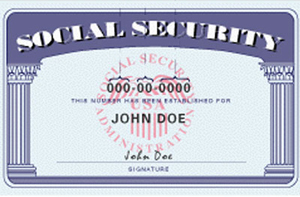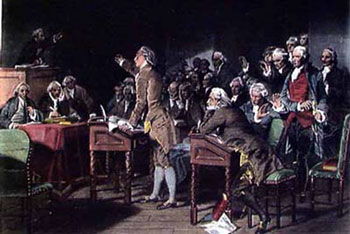Title 42. The Public Health and Welfare

Chapter 7. Social Security Act
Title IV. Grants to States for Aid and Services to Needy Families with Children and for Child-welfare Services
Part D. Child Support and Establishment of Paternity
42 USC § 666 Requirement of statutorily prescribed procedures to improve effectiveness of child support enforcement
(a) Types of procedures required.
In order to satisfy section 454(20)(A) [42 USCS § 654(20)(A)], each State must have in effect laws requiring the use of the following procedures, consistent with this section and with regulations of the Secretary, to increase the effectiveness of the program which the State administers under this part [42 USCS § § 651 et seq.]:
(13) Recording of social security numbers in certain family matters.
Procedures requiring that the social security number of --
(A) any applicant for a professional license, driver's license, occupational license, recreational license, or marriage license be recorded on the application;
(B) any individual who is subject to a divorce decree, support order, or paternity determination or acknowledgment be placed in the records relating to the matter; and
(C) any individual who has died be placed in the records relating to the death and be recorded on the death certificate.
For purposes of subparagraph (A), if a State allows the use of a number other than the social security number to be used on the face of the document while the social security number is kept on file at the agency, the State shall so advise any applicants.
...
(16) Authority to withhold or suspend licenses.
Procedures under which the State has (and uses in appropriate cases) authority to withhold or suspend, or to restrict the use of driver's licenses, professional and occupational licenses, and recreational and sporting licenses of individuals owing overdue support or failing, after receiving appropriate notice, to comply with subpoenas or warrants relating to paternity or child support proceedings.
Religious Freedom Restoration Act (RFRA)
Title 42 Chapter 21B
Religious Freedom Restoration

§ 2000bb. Congressional findings and declaration of purposes
(a) Findings
The Congress finds that —- the framers of the Constitution, recognizing free exercise of religion as an unalienable right, secured its protection in the First Amendment to the Constitution;
- laws “neutral” toward religion may burden religious exercise as surely as laws intended to interfere with religious exercise;
- governments should not substantially burden religious exercise without compelling justification;
- in Employment Division v. Smith, 494 U.S. 872 (1990) the Supreme Court virtually eliminated the requirement that the government justify burdens on religious exercise imposed by laws neutral toward religion; and
- the compelling interest test as set forth in prior Federal court rulings is a workable test for striking sensible balances between religious liberty and competing prior governmental interests.
(b) Purposes
The purposes of this chapter are —- to restore the compelling interest test as set forth in Sherbert v. Verner, 374 U.S. 398 (1963) and Wisconsin v. Yoder, 406 U.S. 205 (1972) and to guarantee its application in all cases where free exercise of religion is substantially burdened; and
- to provide a claim or defense to persons whose religious exercise is substantially burdened by government.
§ 2000bb–1. Free exercise of religion protected
(a) In general
Government shall not substantially burden a person’s exercise of religion even if the burden results from a rule of general applicability, except as provided in subsection (b) of this section.
(b) Exception
Government may substantially burden a person’s exercise of religion only if it demonstrates that application of the burden to the person —
- is in furtherance of a compelling governmental interest; and
- is the least restrictive means of furthering that compelling governmental interest.
(c) Judicial relief
A person whose religious exercise has been burdened in violation of this section may assert that violation as a claim or defense in a judicial proceeding and obtain appropriate relief against a government. Standing to assert a claim or defense under this section shall be governed by the general rules of standing under article III of the Constitution.
§ 2000bb–2. Definitions
As used in this chapter —- the term “government” includes a branch, department, agency, instrumentality, and official (or other person acting under color of law) of the United States, or of a covered entity;
- the term “covered entity” means the District of Columbia, the Commonwealth of Puerto Rico, and each territory and possession of the United States;
- the term “demonstrates” means meets the burdens of going forward with the evidence and of persuasion; and
- the term “exercise of religion” means religious exercise, as defined in section 2000cc–5 of this title.
§ 2000bb–3. Applicability
(a) In general
This chapter applies to all Federal law, and the implementation of that law, whether statutory or otherwise, and whether adopted before or after November 16, 1993.(b) Rule of construction
Federal statutory law adopted after November 16, 1993, is subject to this chapter unless such law explicitly excludes such application by reference to this chapter.(c) Religious belief unaffected
Nothing in this chapter shall be construed to authorize any government to burden any religious belief.§ 2000bb–4. Establishment clause unaffected
Nothing in this chapter shall be construed to affect, interpret, or in any way address that portion of the First Amendment prohibiting laws respecting the establishment of religion (referred to in this section as the “Establishment Clause”). Granting government funding, benefits, or exemptions, to the extent permissible under the Establishment Clause, shall not constitute a violation of this chapter. As used in this section, the term “granting”, used with respect to government funding, benefits, or exemptions, does not include the denial of government funding, benefits, or exemptions.Gonzales v. O Centro Espirita Beneficenteuniao Do Vegetal, affirmed the RFRAs applicability to all federal laws, statutes, codes and rules. This includes 42 USCS 666.
Whereas 42 USCS 666 seeks to withhold funding from states that do not demand a Social Security Administration number from all license applicants, it cannot compell states to violate an individual's right to religious expression, including his resistance to using a SSAN for identification purposes. Likewise, states cannot be compelled to withhold rights and licensing for this same reason.
Should 42 USCS 666 be applied toward extortion, it would force the states to violate the Constitution against their will, and as the well-known maxim of law states: "An act, which is against my will, is not my act."
Because this right applies to individuals and corporations, the net effect is that the Federal government would violate supreme law through coersion and extortion, should States deny any individual's right through discrimination.




